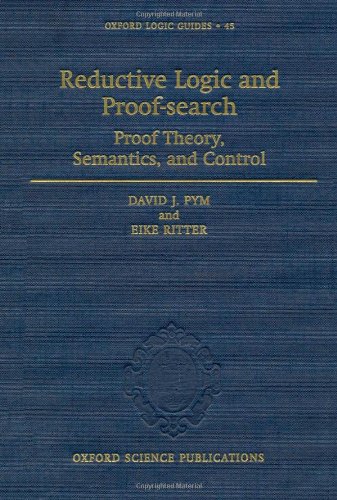

Most ebook files are in PDF format, so you can easily read them using various software such as Foxit Reader or directly on the Google Chrome browser.
Some ebook files are released by publishers in other formats such as .awz, .mobi, .epub, .fb2, etc. You may need to install specific software to read these formats on mobile/PC, such as Calibre.
Please read the tutorial at this link. https://ebooknice.com/page/post?id=faq
We offer FREE conversion to the popular formats you request; however, this may take some time. Therefore, right after payment, please email us, and we will try to provide the service as quickly as possible.
For some exceptional file formats or broken links (if any), please refrain from opening any disputes. Instead, email us first, and we will try to assist within a maximum of 6 hours.
EbookNice Team

Status:
Available0.0
0 reviews
ISBN 10: 0198526334
ISBN 13: 9780198526339
Author: David J Pym, Eike Ritter
This book is a specialized monograph on the development of the mathematical and computational metatheory of reductive logic and proof-search, areas of logic that are becoming important in computer science. A systematic foundational text on these emerging topics, it includes proof-theoretic, semantic/model-theoretic and algorithmic aspects. The scope ranges from the conceptual background to reductive logic, through its mathematical metatheory, to its modern applications in the computational sciences. Suitable for researchers and graduate students in mathematical, computational and philosophical logic, and in theoretical computer science and artificial intelligence, this is the latest in the prestigous world-renowned Oxford Logic Guides, which contains Michael Dummet's Elements of intuitionism (2nd Edition), Dov M. Gabbay, Mark A. Reynolds, and Marcelo Finger's Temporal Logic Mathematical Foundations and Computational Aspects , J. M. Dunn and G. Hardegree's Algebraic Methods in Philosophical Logic, H. Rott's Change, Choice and Inference: A Study of Belief Revision and Nonmonotonic Reasoning , and P. T. Johnstone's Sketches of an Elephant: A Topos Theory Compendium: Volumes 1 and 2 .
1 Deductive Logic, Reductive Logic, and Proof-search
1.1 Introduction
1.2 Logical prerequisites
1.2.1 Basics of classical logic
1.2.2 Basics of intuitionistic logic
1.2.3 Basics of proof systems
1.3 Algebraic prerequisites
1.3.1 Basics of categories
1.4 Outline of the monograph
1.5 Discussion
1.6 Errata and remarks
2 Lambda-calculi for Intuitionistic and Classical Proofs
2.1 Introduction
2.2 Intuitionistic natural deduction
2.2.1 Sequential natural deduction
2.2.2 Natural deduction for intuitionistic predicate logic
2.3 The simply-typed λ-calculus
2.3.1 Normalization and subject reduction
2.3.2 λ-calculi and intuitionistic predicate logic
2.4 Classical natural deduction
2.5 The λμ-, λμ[Omitted]-, λμν-, and λμνε-cal
2.5.1 Proof-objects and realizers
2.5.2 The λμ-calculus
2.5.3 Implication and conjunction
2.5.4 Disjunctive types: The λμν-calculus
2.5.5 The η-rules, strong normalization, and confluence
2.5.6 Explicit substitutions: The λμνε-calculus
2.6 Discussion
3 The Semantics of Intuitionistic and Classical Proofs
3.1 Introduction
3.2 The semantics of intuitionistic proofs
3.2.1 Heyting algebras
3.2.2 Bi-Cartesian closed categories
3.3 Kripke semantics and functor categories
3.3.1 Kripke semantics
3.3.2 Functor categories
3.4 Games
3.4.1 Games for intuitionistic proofs
3.5 Fibred categories
3.6 The semantics of classical proofs
3.6.1 Boolean algebras
3.6.2 Models of classical proofs
3.6.3 Soundness and completeness for λμν
3.6.4 Continuations: Concrete, computational models
3.6.5 Games: Another concrete model
3.7 Comparing the disjunctions; De Morgan Laws
3.8 Discussion
4 Proof Theory for Reductive Logic
4.1 Introduction
4.2 Reductive proof theory
4.2.1 Background
4.2.2 Our perspective
4.3 Representation of sequent derivations in λμνε
4.4 Intuitionistic provability
4.5 Uniform proof and analytic resolution
4.5.1 Uniform proofs
4.5.2 Permutations
4.5.3 Application to (hereditary Harrop) analytic resolution
4.6 Classical resolution
4.7 Intuitionistic resolution
4.7.1 Mints’ intuitionistic resolution
4.7.2 The intuitionistic force of classical resolution
4.8 On complexity
4.9 Discussion
5 Semantics for Reductive Logic
5.1 Introduction
5.2 Semantics for intuitionistic reductive logic
5.2.1 Intuitionistic reduction models
5.2.2 Games for intuitionistic reductions
5.3 Semantics for classical reductive logic
5.3.1 Classical reduction models
5.4 Discussion
6 Intuitionistic and Classical Proof-search and Their Semantics
6.1 Introduction
6.2 Towards a semantics of control: Backtracking
6.3 A games semantics for proof-search
6.4 A concluding example: The semantics of uniform proof
6.5 Discussion
deductive logic books
inductive logic book
deductive logic textbook
deductive reasoning logic and proof
deductive reasoning logic and proof answers
deductive logic proofs
deductive inductive and abductive reasoning pdf
Tags: David J Pym, Eike Ritter, Reductive, logic